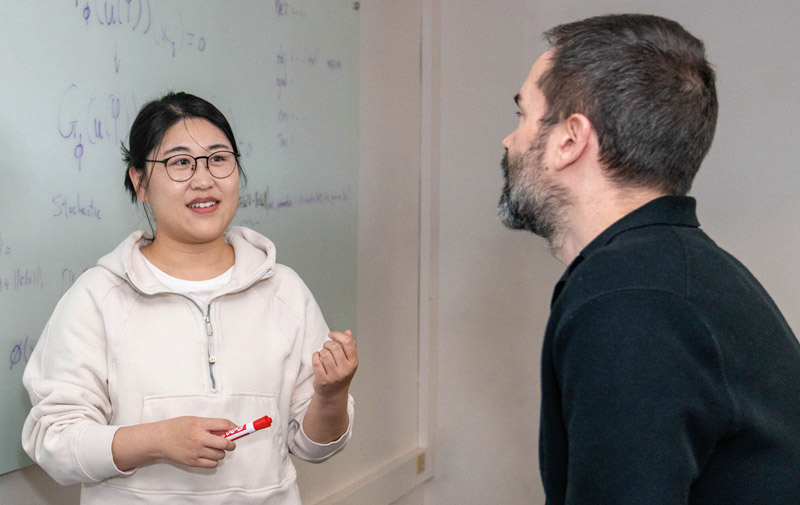
For some PhD students, the path to an academic career can feel like a black box of sorts. How exactly does one make the leap from teaching assistant to professor? From collaborating on research to leading it? From being funded to securing funding? Compared with going into industry, the process of entering academia can appear nebulous, daunting, and intimidating.
 “For the most part, students know that if they go into industry, they’re going to have a boss, and that boss is going to tell them what to do,” says Frank E. Curtis, a professor of industrial and systems engineering (ISE) and director of graduate studies for the department. “But when it comes to academia, students often see faculty as people who are basically running small businesses—managing people and funds, teaching classes, contributing to committees, and things like that. It can seem like a very complicated, difficult job.”
“For the most part, students know that if they go into industry, they’re going to have a boss, and that boss is going to tell them what to do,” says Frank E. Curtis, a professor of industrial and systems engineering (ISE) and director of graduate studies for the department. “But when it comes to academia, students often see faculty as people who are basically running small businesses—managing people and funds, teaching classes, contributing to committees, and things like that. It can seem like a very complicated, difficult job.”
There’s no question that academia is demanding. But it’s also creative, intellectually stimulating, and rewarding. “As a professor, you have the opportunity to do research that’s on the cutting edge and that can put you on a path to make the next breakthrough in your field,” says Curtis. “You’re also in a position to make breakthroughs with your students, where you’re able to help them get to a deeper understanding of very complicated concepts.”
In 2021, Curtis created the Lehigh ISE Future Academic Career Experiential Training (FACET) program, in part to shine a light into that black box and reveal the many possibilities of an academic career. All ISE PhD students are eligible to participate in FACET, and its purpose is to give them information, skills, and opportunities that will boost their confidence, enhance their resumes, and, ultimately, help them land positions in universities across the country and around the world.
At the heart of the program are monthly meetings with guest speakers featuring ISE faculty and alumni, as well as external educators. Topics range from what it’s like to work in a national lab versus academia; why a postdoc position can be a good bridge to a faculty position; how to apply for research funding; how to balance research, teaching, and service as a faculty member; and what makes for a good application for both postdoctoral and faculty positions. Each talk is followed by a Q&A session.
“With these meetings, we’re trying to break down the process so it becomes clearer and doesn’t feel so imposing,” says Curtis. “And when it comes to their resumes, we’re not only helping students understand how to make themselves stand out, but we’re giving them the opportunities to actually do those things.”
For example, ISE PhD students are now teaching (or co-teaching with a peer) some 400-level classes. “When our department has open faculty positions, we often get applicants who have no teaching experience beyond working as a TA,” says Curtis. “So having our PhD students instruct their own classes goes a long way in demonstrating their interest and willingness to seek out additional experience, and that gives them an edge.”
The program also helps students identify opportunities for additional research collaboration outside the typical PhD candidate-advisor partnership. “These relationships are important for a strong resume,” says Curtis. “So we’re here to help our students build them.”
FACET also works with the Lehigh ISE Outreach Program (OutreachISE)—an initiative that aims to improve awareness of and promote research in ISE—to provide mentorship opportunities to undergraduate and master’s students on research projects. “Students in FACET can also mentor younger kids in middle and high school during summer camps–like CHOICES–on campus, and develop projects and games that introduce the kids to the basics of what industrial systems and engineering is,” says Curtis. “It’s a great opportunity for graduate students to get a sense of what the service component is all about in academia.”
The overarching goal, he says, is to increase the number of ISE students securing postdoctoral fellowships and going into faculty positions. “As an elite research institution, we want our graduates to become part of the academy where they’ll be making important contributions to the advancement of science and engineering,” he says.
FACET has grown every year, and now includes one-third of the department’s PhD students. One of them is Qi Wang. When she came to Lehigh in 2020, she’d already spent several years working as a software engineer at a startup in China. She knew she wanted to transition into research, but when she began her doctoral program, she wasn’t planning on an academic career.
“My goal at the time was to work as a researcher in a company or institute,” she says. “Back then, I didn’t have the confidence to even think about trying for a faculty position. Academia is really competitive compared to industry, and I didn’t think I could get hired. I was also intimidated by having to fund my own research as a professor. It all felt really difficult, and I just didn’t think I was good enough.”
That mindset initially kept her from joining FACET. But in her second year as a PhD student, a friend mentioned the recent seminars he’d attended. He explained how assistant professor Xiu Yang had talked about his experience working at a national lab and compared it with being on the ISE faculty at Lehigh, and how assistant professor Karmel Shehadeh described her transition from a PhD student to a postdoc to a junior faculty member.
 These were exactly the real-world experiences that Wang wanted to learn more about. “I really regretted missing those talks,” she says. “They would have clarified so much for me, and given me a better idea of what to expect in both industry and academia, and what the application process is really like to become a professor. It would have helped me understand what my strengths are, and what I would need to work on. I joined FACET immediately after that.”
These were exactly the real-world experiences that Wang wanted to learn more about. “I really regretted missing those talks,” she says. “They would have clarified so much for me, and given me a better idea of what to expect in both industry and academia, and what the application process is really like to become a professor. It would have helped me understand what my strengths are, and what I would need to work on. I joined FACET immediately after that.”
She’s since attended talks on how to apply for grants as a junior professor, the pros and cons of doing a postdoc prior to applying for a faculty position, and how teaching can open up a range of creative possibilities to contribute to both students and the field as a whole. “I really enjoy helping students learn, and that seminar made me realize just how fulfilling teaching could be,” she says.
Her time in FACET has directly affected her career trajectory. This spring, Wang, who researches nonlinear optimization, will be co-teaching her first course–an operational research class for master’s students. And next year, she plans to apply for a postdoctoral position, a step she feels—thanks to FACET—will give her more time to hone her research skills, expand her network of collaborators, and position herself to achieve her top aspiration: becoming a professor.
“Going to the seminars, talking to the professors, and talking with other students in the program has made academia feel less intimidating,” she says. “I feel much more confident now.”
